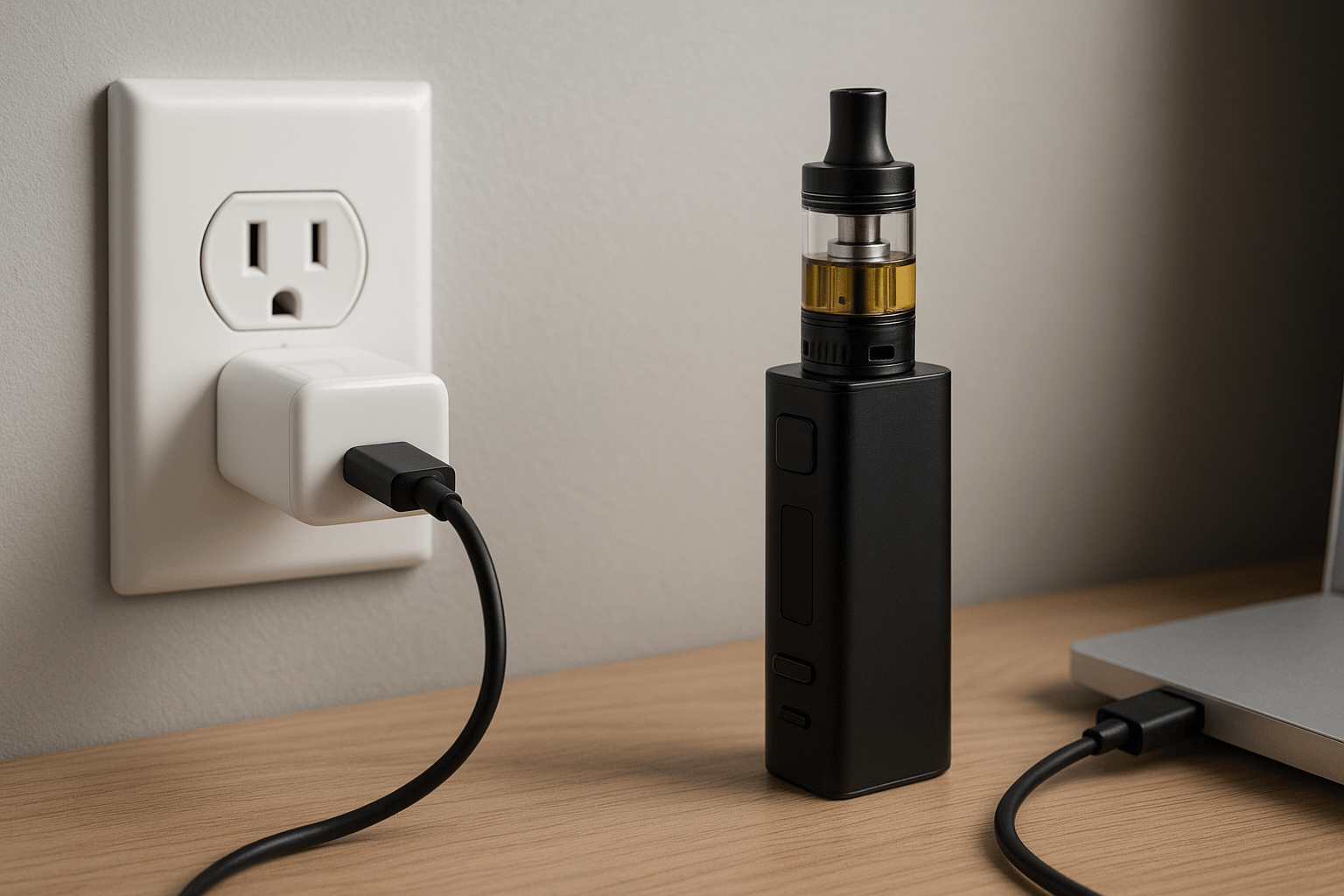Charging Your Vape Safely: Wall Adapter vs. USB Port

Did you know the way you charge your vape could shorten its battery life—or even put you at risk of overheating or fire hazards? Charging might seem like a routine task, but the method you use makes all the difference in safety and performance.
Whether you’re new to vaping or a seasoned user, understanding the differences between wall adapter charging and USB port charging is key to keeping your device safe, efficient, and long-lasting.
This guide breaks down how vape batteries work, the pros and cons of each charging method, and the safest practices every vaper should follow.
Quick Navigation
- Understanding Vape Batteries: Why Charging Method Matters
- Wall Adapter Charging: Fast, Stable, and Ideal for Daily Use
- USB Port Charging: Convenient but Caution Required
- Best Practices for Charging Your Vape Battery Safely
- Which Charging Method Is Best for You?
- Final Thoughts: Charge Smart, Vape Safe
Understanding Vape Batteries: Why Charging Method Matters
Most modern vape devices use lithium-ion or lithium-polymer batteries because they’re compact, powerful, and rechargeable. However, these batteries require proper handling.
Why proper charging matters:
-
Overcharging can lead to overheating, swelling, or even explosions.
-
Incorrect voltage/amperage degrades cells and shortens lifespan.
-
Manufacturer charging guidelines exist to keep your device safe and reliable—always follow them.
Wall Adapter Charging: Fast, Stable, and Ideal for Daily Use
Pros
-
Faster charging speeds: Adapters often provide 5V/1–2A, reducing charge time.
-
Stable power supply: Consistent voltage compared to some USB ports.
-
Convenient for daily use at home or work.
Cons
-
Risk of voltage mismatch if using cheap or incompatible adapters.
-
Less portable, since you’re tied to a wall outlet.
Safe Charging Tips
-
Always use the charger included with your vape or manufacturer-approved replacements.
-
Stick to output ratings of 5V / 1–2A.
-
Avoid uncertified or generic adapters.
USB Port Charging: Convenient but Caution Required
Benefits
-
Portable: Charge via laptop, car, or power bank.
-
No extra charger needed: Just a cable.
Risks
-
Inconsistent power delivery, especially on older ports.
-
Slower charging: Many ports max out at 0.5–0.9A.
-
Potential overheating if the port doesn’t regulate voltage properly.
USB Port Types Breakdown
| USB Type | Max Output | Charging Suitability |
|---|---|---|
| USB 2.0 | 5V / 0.5A | Too slow, emergency use only |
| USB 3.0 | 5V / 0.9A | Acceptable, but not ideal |
| USB-C (PD) | 5V / 2A+ | Best USB option if device supports it |
Safer USB Charging Tips
-
Avoid charging from unknown or old USB ports.
-
Unplug once fully charged—don’t leave your vape connected overnight.
-
Use USB-C with power delivery if compatible.
Wall Adapter vs. USB Port: Comparison at a Glance
| Feature | Wall Adapter | USB Port |
|---|---|---|
| Charging Speed | Fast (5V/1–2A) | Slower (0.5–0.9A, unless USB-C PD) |
| Power Stability | Stable & reliable | Varies by device/port |
| Portability | Limited (needs wall outlet) | Highly portable (laptop, car, power bank) |
| Best For | Daily charging at home/work | On-the-go or emergency charging |
| Risks | Wrong/cheap adapter → overcharge | Overheating, unstable voltage |
Best Practices for Charging Your Vape Battery Safely
✔ Use manufacturer-approved chargers and cables
✔ Charge on a flat, fire-resistant surface
✔ Monitor while charging—don’t leave unattended
✔ Avoid extreme heat or cold environments
✔ Replace damaged batteries immediately
❌ Don’t charge overnight
Which Charging Method Is Best for You?
-
Choose a wall adapter if: You want fast, stable charging and mostly charge at home.
-
Choose a USB port if: You need flexibility on the go—ideally with modern USB-C support.
Either way, following your device’s charging specifications is the key to safety and performance.
Final Thoughts: Charge Smart, Vape Safe
Charging your vape isn’t just a routine—it’s a crucial part of device care and personal safety. By understanding the strengths and risks of wall adapter vs. USB port charging, you can:
-
Extend your vape’s battery lifespan
-
Prevent costly damage
-
Keep your vaping experience smooth and safe
We’d love to hear from you! Do you usually charge with a wall adapter or a USB port? Drop your thoughts and experiences in the comments below.
Want more expert vape safety tips and exclusive guides? Subscribe to our newsletter today and get fresh content delivered straight to your inbox.